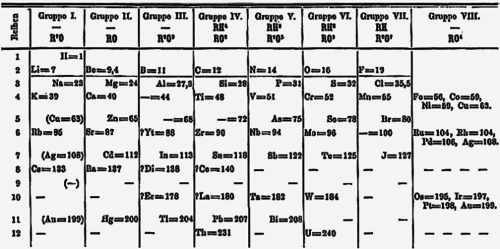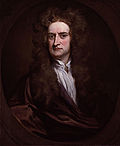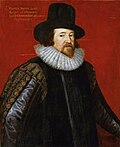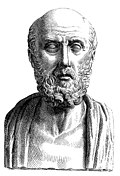Portal:History of science
The History of Science Portal
The history of science covers the development of science from ancient times to the present. It encompasses all three major branches of science: natural, social, and formal. Protoscience, early sciences, and natural philosophies such as alchemy and astrology that existed during the Bronze Age, Iron Age, classical antiquity and the Middle Ages, declined during the early modern period after the establishment of formal disciplines of science in the Age of Enlightenment.
Science's earliest roots can be traced to Ancient Egypt and Mesopotamia around 3000 to 1200 BCE. These civilizations' contributions to mathematics, astronomy, and medicine influenced later Greek natural philosophy of classical antiquity, wherein formal attempts were made to provide explanations of events in the physical world based on natural causes. After the fall of the Western Roman Empire, knowledge of Greek conceptions of the world deteriorated in Latin-speaking Western Europe during the early centuries (400 to 1000 CE) of the Middle Ages, but continued to thrive in the Greek-speaking Byzantine Empire. Aided by translations of Greek texts, the Hellenistic worldview was preserved and absorbed into the Arabic-speaking Muslim world during the Islamic Golden Age. The recovery and assimilation of Greek works and Islamic inquiries into Western Europe from the 10th to 13th century revived the learning of natural philosophy in the West. Traditions of early science were also developed in ancient India and separately in ancient China, the Chinese model having influenced Vietnam, Korea and Japan before Western exploration. Among the Pre-Columbian peoples of Mesoamerica, the Zapotec civilization established their first known traditions of astronomy and mathematics for producing calendars, followed by other civilizations such as the Maya.
Natural philosophy was transformed during the Scientific Revolution in 16th- to 17th-century Europe, as new ideas and discoveries departed from previous Greek conceptions and traditions. The New Science that emerged was more mechanistic in its worldview, more integrated with mathematics, and more reliable and open as its knowledge was based on a newly defined scientific method. More "revolutions" in subsequent centuries soon followed. The chemical revolution of the 18th century, for instance, introduced new quantitative methods and measurements for chemistry. In the 19th century, new perspectives regarding the conservation of energy, age of Earth, and evolution came into focus. And in the 20th century, new discoveries in genetics and physics laid the foundations for new sub disciplines such as molecular biology and particle physics. Moreover, industrial and military concerns as well as the increasing complexity of new research endeavors ushered in the era of "big science," particularly after World War II. (Full article...)
Selected article -

and making alloys like bronze.
The protoscience of chemistry, and alchemy, was unsuccessful in explaining the nature of matter and its transformations. However, by performing experiments and recording the results, alchemists set the stage for modern chemistry. (Full article...)
Selected image

This famous sequence of photographs, depicting a horse in motion, was created by Eadweard Muybridge in 1904. His technique involved multiple cameras, linked by an electrical trigger, to capture many images in rapid succession. Muybridge demonstrated this and many other sets of motion photographs to the public using his zoopraxiscope, a precursor of motion pictures.
Did you know
...that Einstein's famous letter to FDR about the possibility of an atomic bomb was actually written by Leó Szilárd?
...that geology was transformed in the latter part of the 20th century after widespread acceptance of plate tectonics?
...that the idea of biological evolution dates to the ancient world?
Selected Biography -
Lorna Margaret Arnold OBE (née Rainbow; 7 December 1915 – 25 March 2014) was a British historian who wrote several books connected with the British nuclear weapons programmes.
A graduate of Bedford College, London, she trained as a teacher at the Cambridge Training College for Women, but left teaching in 1940. During the Second World War, she served with the Army Council secretariat. In 1944, she transferred to the Foreign Office to head a section of the secretariat of the European Advisory Commission. In June 1945, she moved to Berlin as part of the Allied Control Council, working in the Economic Directorate alongside counterparts from France, America and Russia to co-ordinate administering the districts and supplying food to the population. She was posted to Washington, D.C., in November 1946 as part of the British negotiating team that agreed to merge the U.S. and British zones of Allied-occupied Germany into Bizonia, and remained at the Pentagon until 1949. (Full article...)
Selected anniversaries
- 1817 - Birth of Karl Wilhelm von Nägeli, Swiss biologist (d. 1891)
- 1845 - Birth of Wilhelm Conrad Röntgen, German physicist, Nobel Prize laureate (d. 1923)
- 1847 - Birth of Otto Wallach, German chemist, Nobel Prize laureate (d. 1931)
- 1850 - Death of Wilhelm Beer, German astronomer (b. 1797)
- 1897 - Birth of Douglas Hartree, English mathematical physicist (d. 1958)
- 1910 - Death of Alexander Emanuel Agassiz, American scientist; son of Louis Agassiz (b. 1835)
- 1942 - Birth of John E. Sulston, British chemist, recipient of the Nobel Prize in Physiology or Medicine
- 1967 - Death of Jaroslav Heyrovský, Czech chemist, Nobel Prize laureate (b. 1890)
- 2007 - Death of Paul Lauterbur, American chemist, Nobel laureate (b. 1929)
Related portals
Topics
General images
Subcategories
Things you can do
Help out by participating in the History of Science Wikiproject (which also coordinates the histories of medicine, technology and philosophy of science) or join the discussion.
Associated Wikimedia
The following Wikimedia Foundation sister projects provide more on this subject:
-
Commons
Free media repository -
Wikibooks
Free textbooks and manuals -
Wikidata
Free knowledge base -
Wikinews
Free-content news -
Wikiquote
Collection of quotations -
Wikisource
Free-content library -
Wikiversity
Free learning tools -
Wiktionary
Dictionary and thesaurus








































































